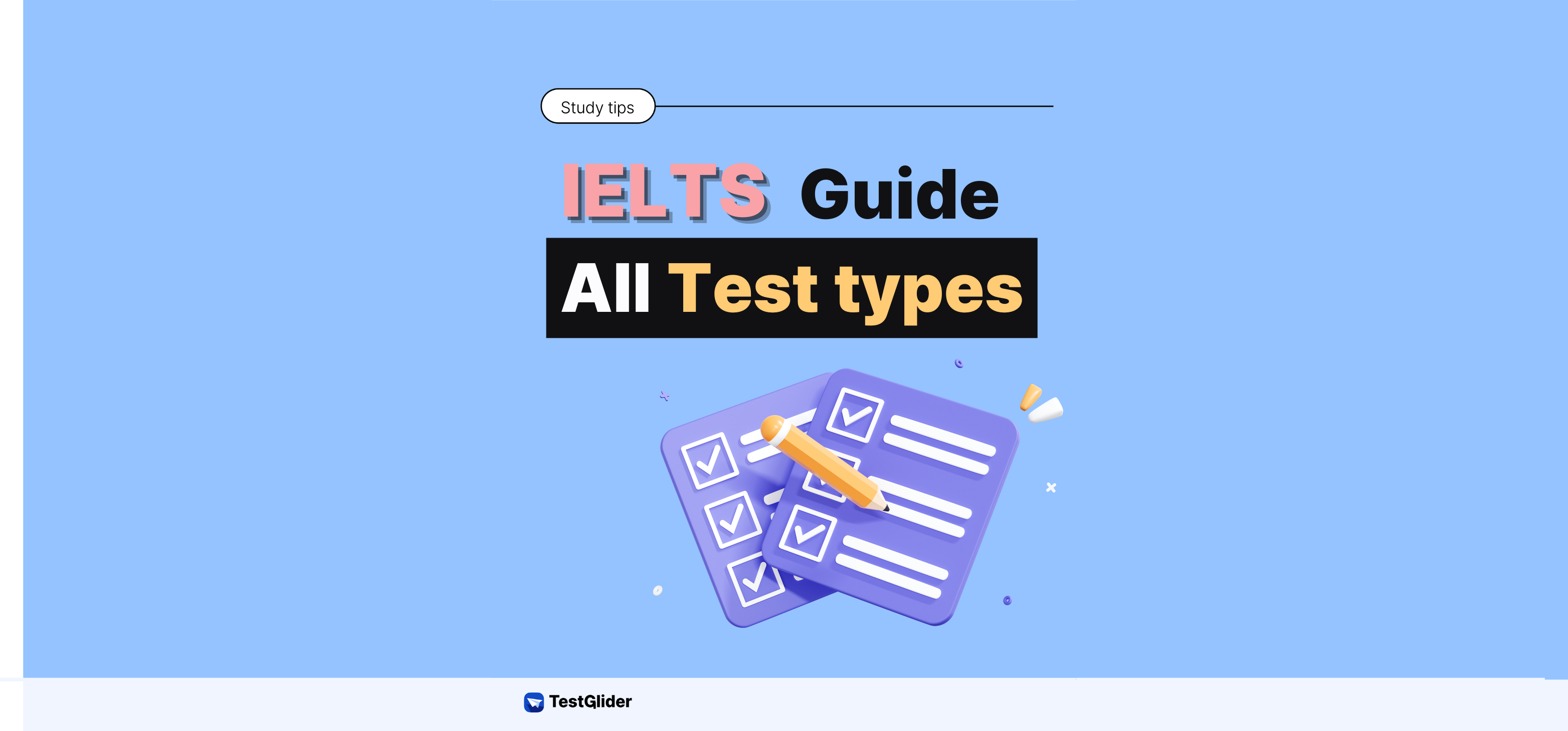Are you Confused About the Different Types of IELTS Exams?
Hello! This is Testglider, the No.1 TOEFL & IELTS AI tutor, proven by over 720,000 global users. Have you ever decided to take the IELTS exam, only to get confused by the numerous types available on the official IDP website? With so many options like Academic, General Training, UKVI, computer-based, and paper-based tests, it’s understandable to feel overwhelmed and curious about the differences between them. Today, we’ll dive into the various types of IELTS exams, their features, and key differences. We’ll also provide a Q&A session to help you determine which IELTS test is best suited for you. Let’s explore the different types of IELTS exams with Testglider, your essential guide to mastering standardized English tests!
Analysis of IELTS Exam Types
1) Exam Categories
① IELTS Academic VS General Training
Let’s explore the differences between IELTS Academic and IELTS General Training. These two tests serve different purposes and have distinct differences in eligibility requirements, objectives, and the content evaluated in each section.
Purpose of the Exam
- Academic: This exam is for those planning to pursue higher education or obtain professional registration in an English-speaking country.
- General Training: This test is for those who plan to live or work in an English-speaking country. It focuses on evaluating the test taker’s ability to communicate in everyday situations, measuring proficiency, confidence, and comfort in using English in native-speaking environments.
Evaluation Content
- IELTS Academic: This test assesses whether a student is ready to study in an English-speaking environment, particularly in higher education or professional settings. It evaluates proficiency at an academic level.
- IELTS General Training: This test evaluates practical and everyday English proficiency. We recommend this for those planning to participate in secondary education, vocational training, or other similar programs.
Reading Section
- IELTS Academic: Includes three long passages covering a wide range of topics. These often include diagrams, graphs, and images, so it’s helpful to develop quick interpretation skills for such materials.
- IELTS General Training: This section is divided into three parts. The first part includes 2-3 factual passages, the second part has 2 work-related passages, and the third part features a long passage on a general topic.
Writing Section
- IELTS Academic: Task 1 requires you to describe a diagram, chart, or graph in at least 150 words. Task 2 involves writing an essay expressing your opinion on a given topic, requiring at least 250 words.
- IELTS General Training: Task 1 involves writing a letter, while Task 2 is an essay. The word count requirement is the same as the Academic test, but the topics differ.
Given these differences, it’s important to verify the English qualification requirements of the institution where you plan to submit your IELTS score before deciding between IELTS Academic and General Training.
② Computer-based VS Paper-based IELTS
The computer-based and paper-based IELTS tests differ in terms of result release dates, test dates, and answer input methods.
Result Release Date
: Paper-based IELTS results are released within 13 days, whereas computer-based results are available within 3-5 days.
Test Dates
: Paper-based IELTS is conducted four times a month (three Saturdays and one Thursday), while computer-based IELTS is available more than 50 times a month.
Answer Input Method
: For paper-based IELTS, answers are written with a pencil on the answer sheet. For computer-based IELTS, answers are entered using a computer keyboard and mouse. The speaking test method remains the same for both.
③ IELTS VS UKVI
IELTS and IELTS UKVI are identical in terms of exam type, content, scoring, and difficulty level. The differences lie in test centers, fees, security measures, and online testing availability.
Eligibility
: IELTS is available at various centers worldwide, while UKVI is only available at specific centers approved by the UK Visas and Immigration (UKVI). UKVI is designed to meet the UK immigration requirements, hence the stricter eligibility criteria.
Exam Fees
: The fee for IELTS is 286,000 KRW, while UKVI costs 318,000 KRW. The higher fee for UKVI is due to enhanced security and supervision measures.
Other Considerations
: Unlike IELTS, UKVI has stricter security measures, making it impossible to take the exam online from home.
For more detailed information, follow the link below.
Conclusion
There are eight different types of IELTS exams based on the above three categories. Note that online IELTS is highly limited and is not included in this classification.

2) Related Q&A about IELTS exam types
1) Is there a difference in difficulty between IELTS General Training and IELTS Academic?
They say General Training is easier since it measures everyday English proficiency, unlike the more academic-focused IELTS Academic.
2) Is there a difference in difficulty between IELTS and UKVI?
No, according to the official IELTS organizer IDP, both exams have the same difficulty level.
3) I’m applying to U.S. universities. Which IELTS test should I take?
Generally, you should take the IELTS Academic paper-based test. Some institutions may not accept the computer-based version. Since you’re applying to U.S. universities, the standard IELTS test is more appropriate over UKVI since it is for UK immigration purposes. However, always check with your target university beforehand.
If you have more questions about IELTS, please refer to the post below.
2024 Second Half IELTS test Dates (and Necessary Materials!)
